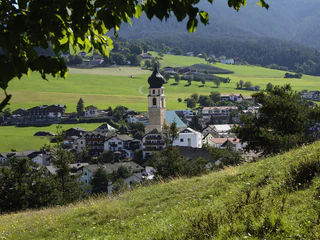
San Silvestro Chapel
Prato alla Drava/Winnebach, Innichen/San Candido, Dolomites Region 3 Zinnen
Voel de spirituele kracht van deze plaatsen, bewonder de Romaanse architectuur en gotische fresco's of ontsnap gewoon even aan het leven van alledag. Ontdek de bijzonderheden van de vele kerken, kapellen en kloosters uit verschillende tijdperken en stijlen.

Prato alla Drava/Winnebach, Innichen/San Candido, Dolomites Region 3 Zinnen

1/3
Collepietra/Steinegg, Karneid/Cornedo all'Isarco, Dolomites Region Eggental

Collepietra/Steinegg, Karneid/Cornedo all'Isarco, Dolomites Region Eggental

Dobbiaco Nuova/Neutoblach, Toblach/Dobbiaco, Dolomites Region 3 Zinnen

1/3
Fiè/Völs, Völs am Schlern/Fiè allo Sciliar, Dolomites Region Seiser Alm

Anterselva di Sotto/Antholz-Niedertal, Rasen-Antholz/Rasun Anterselva, Dolomites Region Kronplatz/Plan de Corones

1/2
Nova Ponente Centro/Deutschnofen Dorf, Deutschnofen/Nova Ponente, Dolomites Region Eggental

Welschnofen/Nova Levante, Dolomites Region Eggental

1/3
Badia/Badia, Badia, Dolomites Region Alta Badia

Rasun di Sopra/Oberrasen, Rasen-Antholz/Rasun Anterselva, Dolomites Region Kronplatz/Plan de Corones

1/4
Sesto/Sexten, Sexten/Sesto, Dolomites Region 3 Zinnen

1/2
Alpe di Siusi/Seiseralm, Kastelruth/Castelrotto, Dolomites Region Seiser Alm

1/3
Prato alla Drava/Winnebach, Innichen/San Candido, Dolomites Region 3 Zinnen

Carezza/Karersee, Welschnofen/Nova Levante, Dolomites Region Eggental

1/3
Dobbiaco Nuova/Neutoblach, Toblach/Dobbiaco, Dolomites Region 3 Zinnen

1/2
La Val/La Val, La Val, Dolomites Region Alta Badia

Sesto/Sexten, Sexten/Sesto, Dolomites Region 3 Zinnen

Braies di Dentro/Innerprags, Prags/Braies, Dolomites Region 3 Zinnen

1/3
Brunico città/Bruneck Stadt, Bruneck/Brunico, Dolomites Region Kronplatz/Plan de Corones

1/2
Dobbiaco Nuova/Neutoblach, Toblach/Dobbiaco, Dolomites Region 3 Zinnen

1/2
Dobbiaco Nuova/Neutoblach, Toblach/Dobbiaco, Dolomites Region 3 Zinnen

San Cassiano/San Cassiano, Badia, Dolomites Region Alta Badia

Rasun di Sopra/Oberrasen, Rasen-Antholz/Rasun Anterselva, Dolomites Region Kronplatz/Plan de Corones

Ortisei/Urtijëi/St. Ulrich/Urtijëi, Urtijëi/Ortisei, Dolomites Region Val Gardena

1/3
La Val/La Val, La Val, Dolomites Region Alta Badia

Merano/Meran, Meran/Merano, Dolomites Region Val Gardena

Rasun di Sotto/Niederrasen, Rasen-Antholz/Rasun Anterselva, Dolomites Region Kronplatz/Plan de Corones

Sesto/Sexten, Sexten/Sesto, Dolomites Region 3 Zinnen

Braies di Dentro/Innerprags, Prags/Braies, Dolomites Region 3 Zinnen

1/3
Villabassa/Niederdorf, Niederdorf/Villabassa, Dolomites Region 3 Zinnen